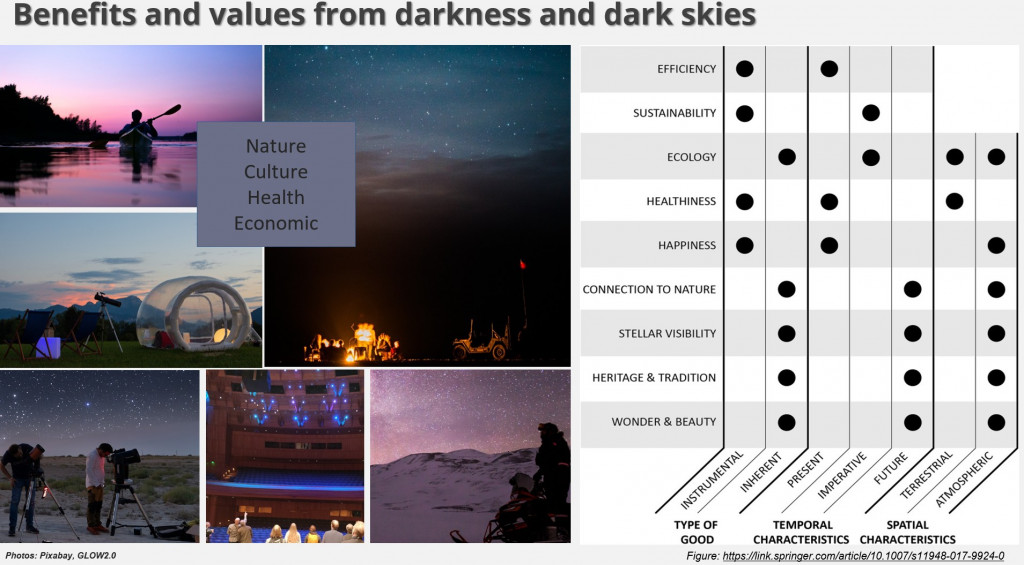Embracing the Night II: Benefits for Tourism
Osion ääriviiva
-
The Importance of Darkness in Tourism and Beyond
Protecting the dark skies offers a wide range of benefits across cultural, scientific, ecological, aesthetic, economic, and health domains. Among these, tourism stands out as a key area where preserving natural darkness generates significant value. Dark-sky tourism, such as stargazing experiences and night-sky tours, not only supports local economic growth but also fosters cultural appreciation and ecological conservation. By safeguarding the natural night environment, we ensure that these unique tourism opportunities and their associated benefits remain accessible for future generations (Stone 2017).
The development of life on Earth has been intricately shaped by the interplay of light and darkness, governed by celestial bodies such as the sun, moon, and stars. Variations in the intensity, spectrum, and periodicity of light have influenced vital processes, including human health, plant growth cycles, and wildlife behaviors like reproduction and migration. Protecting the natural rhythm of light and dark is therefore essential for sustaining ecological balance. (Pirinen 2023.)
Throughout history, societies have relied on the dark sky and celestial patterns for navigation, agriculture, and scientific discovery. Observations of the night sky have not only informed groundbreaking theories but also provided insights into Earth's systems and the mysteries of the universe. The preservation of dark skies keeps this legacy alive and ensures that future generations can continue to explore and learn from the cosmos.
Moreover, the cultural and historical significance of the night sky is deeply embedded in place-based histories, stories, and traditions. These narratives connect humanity to the night in profound ways, adding intrinsic value to its preservation. By emphasizing tourism's role in this context, we highlight how the natural beauty of dark skies creates memorable experiences, strengthens local economies, and deepens our shared cultural heritage.

The Importance of Natural Darkness in Tourism
Natural darkness plays a vital role in tourism by enhancing visitor experiences and supporting various values. Below is a breakdown of how these values connect to tourism.
- Ecological values: Natural darkness supports nocturnal creatures like pollinators and pest-controlling insects, which help maintain biodiversity and food security. This ecological balance is essential for sustainable tourism.
- Cultural values: The night sky has inspired humans for centuries, featuring in stories and traditions tied to specific places. Evening access to cultural heritage sites also deepens visitors' connection with history and nature.
- Aesthetic values: The beauty of starry skies, meteor showers, eclipses, the northern lights, and illuminated landscapes creates unforgettable experiences for tourists, evoking wonder and inspiring return visits.
- Scientific values: The night sky is a window to the universe, providing opportunities for stargazing and astronomy-related tourism—making science accessible and fascinating for visitors.
- Economic values: Natural darkness adds value to tourism by boosting visitor satisfaction and generating word-of-mouth recommendations. Efficient night-time lighting can also reduce costs for tourism businesses while enhancing the experience.
- Health and wellness values: Experiencing natural darkness can improve sleep, reduce stress, and enhance overall wellbeing for both visitors and employees. Interactions with nature at night also have restorative effects, contributing to memorable and healthful tourism experiences.
By recognising these values, tourism can thrive while preserving the beauty and benefits of natural darkness.
Activity: Identifying Darkness-Related Values for Tourism
Based on the values listed above, identify five key aspects of darkness or dark skies in your region that might appeal to visitors. These could include unique natural features, cultural connections, or recreational opportunities associated with darkness. If your region attracts both domestic and international visitors, consider noting which aspects might appeal more to each group.
Next, think about how these features could be included in your existing tourism offerings. For example, could they be promoted as part of guided tours, night-time events, or stargazing experiences? Write down practical ideas for integrating these elements into your region’s tourism products to enhance overall visitor attraction.
Tip: Emphasize the unique and memorable qualities of dark sky experiences, as they can provide visitors with opportunities for relaxation, education, and adventure.-
Pirinen, P. 2023. Pimeys, valo ja valosaaste [Darkness, light and light pollution]. https://glow.karelia.fi/pimeys-valo-ja-valosaaste/
Stone, T. 2017. The Value of Darkness: A Moral Framework for Urban Nighttime Lighting. Sci Eng Ethics 24, 607–628 (2018). https://doi.org/10.1007/s11948-017-9924-0 . Open Access.